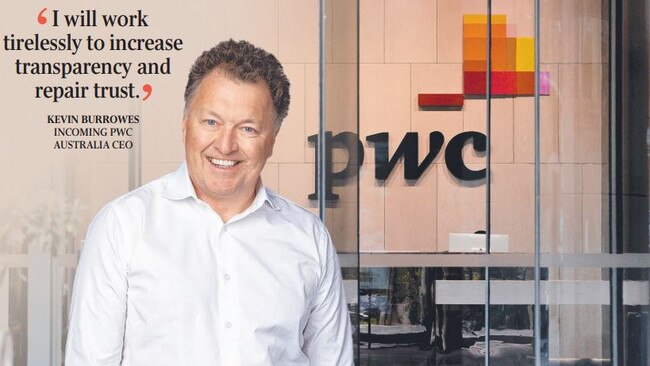
The global PwC network led by New York-based global chair, Bob Moritz, formally stepped in over the weekend to take effective management control of the drifting Australian arm. It’s a highly unusual step for the federation of PwC member firms to take action over a local partnership but the decision was seen necessary to stem the bleeding in Australia and prevent the ugly tax scandal from spreading around the world.
For context the last major action by the global network was to pull the PwC licence from Russia when the Ukrainian war broke out.
On Sunday PwC named Kevin Burrowes, a long-time PwC partner and currently the global clients leader, as the new CEO for the Australian business. Burrowes, currently based in Singapore, will become a partner in PwC Australia and relocate to Sydney. Until then acting PwC Australia chief Kristin Stubbins will remain in the role.
Still, the appointment smacks more of self preservation than genuine reform. While Burrowes has a reputation inside PwC as a top troubleshooter and governance expert, it sends the wrong message about the audit firm putting in its own people to sort out deep-seated cultural problems that seem to have been embedded at the highest level. An outsider would have shown the firm is serious about reform and is more likely to wield the axe where needed.
As a career PwC partner, Burrowes will have his work cut out to show he is taking radical action rather than just going through the motions of talking about a cultural overhaul by PowerPoint with little real consequences for those involved.

It was significant that PwC’s Moritz on Sunday said past leadership in Australia had “failed to meet the network’s code of conduct and uphold the network’s professional standards and values”. He also apologised to clients and staff for the scandal.
Even with PwC Australia operating as a stand alone entity, the global board made the call to step in given the potential for the Australian scandal to hurt relationships with the firm’s prized global client list – including Silicon Valley tech companies that stood to benefit from the confidential tax information that was shared through PwC.
Nor will new CEO Burrowes have much financial runway ahead to undertake a restructure with PwC’s auditing and consulting work fast-drying up. Any rebuild of PwC will take years and at the other end it will be as a significantly slimmer audit firm with only limited consulting capacity.
Bell tolls
Partners are already taking action into their own hands. Faced with the implosion of their once-lucrative government consulting business, dozens of PwC’s embattled partners had little choice but to engineer a rapid exit.
Some 130 partners have joined up with private equity player Allegro Funds to buy out a large chunk of the firm that mostly deals with sensitive government clients for a token price of just $1. PwC Australia is virtually giving the business away.
It is a big unknown if the big promises under the Allegro deal designed to clean up and strengthen the government business – which has a working name of Bell – will be enough to win back the confidence of government clients and salvage what is left of the operation that employs more than 2000 and generates hundreds of millions in revenue.
The government business set to be carved off does not include auditing or the deeply-troubled tax advice arm, which remains PwC Australia. These two areas could also be the source of future litigation or potential fines, so in effect the partners moving with Bell are prepared to give the business away to avoid future liabilities.
But if successful, the Allegro deal could serve as a template for how consultants are likely to work with government clients in the future. Despite demands from all sides of politics to stamp out consultants all together, governments and departments are going to continue to use them given the public sector may lack expertise or simply need to temporarily scale up staff. They also need external expert advice on policy or specialist input into significant decisions or technology matters. However consulting both for business and government has been dominated by the big four accounting firms and the sector is riddled with conflicts – both real and perceived.

Those conflicts came to light in the worst way when a PwC Canberra-based tax partner was found to have been using confidential ATO information to offer a swag of corporate clients ways to get around tough new multinational tax rules.
And in a damning insight into PwC’s culture, senior partners seemingly aware of the behaviour chose to look the other way while the firm was winning lucrative corporate business.
Key to the new business model for the Bell government consulting business are two critical areas designed to stamp out conflicts.
Its mandate in the future means it will only work with government clients and therefore this pure play model will eliminate the biggest conflict of a one-stop shop providing advice to corporate clients often impacted by major policy decisions. Indeed this style of government-only consulting could heap pressure on rival firms to consider an overhaul of their own consulting arms.
At the same time the Bell business will have an ASX-style corporate structure with an independent board and an independent chair to oversee governance of the business. It will no longer be built around partnerships, rather it will be shareholders with Allegro for now, holding a key stake. It was the partnership model that was part of the problem inside PwC given it encourages poor governance and clearly failed to regulate bad behaviour.
As well as proposed changes to the structure, Bell has promised to adopt all the recommendations of an investigation into the firm being overseen by Ziggy Switkowski that apply to the government consulting arm.
Consulting bet
The Bell business provides high level consulting for all levels of government from states to public sector enterprises and of course national departments and agencies. It specialises in health, infrastructure and defence. Given that tentative agreement on deal only come together in less than two weeks, Bell was given as a working title and the business is likely to be renamed at a later date.
While Allegro looks to be getting Bell at a steal, it takes over liabilities and will need to invest heavily in building up a new technology and business platform that will be completely independent from PwC Australia. It is also a big bet on whether PwC’s government clients have gone for good.
For the partners involved in Bell it a was a case of take action now or face a rapid demise. Since the tax advice scandal came to light and the reputational hits to PwC that followed, all levels of the accounting firm’s government client work has effectively been frozen with most agency heads vowing to cut ties with PwC.
To be fair many in PwC’s government business were oblivious to the behaviour in the rogue tax advice arm, with hundreds of employees facing an uncertain future even if a sale moves ahead.
The hits have kept coming for PwC with private sector work also drying up, as no one in the corporate world wants to get into bed with the accounting firm that has been condemned by the Prime Minister, the Treasurer, the Reserve Bank and is also subject to an AFP criminal investigation.
In consulting reputation is all you have and PwC’s jaw-dropping behaviour right at the top has left the entire business critically wounded its entire business.
The test of Bell is whether it can convince government clients this is not simply the PwC of old when it comes to renewing contracts as well as winning more work. For PwC Australia’s remaining clients that might be too much of a tough ask.








PwC Australia is facing its own multi-year battle to put a damaging tax scandal behind it, with the carve-up of the big four accounting firm only just beginning.